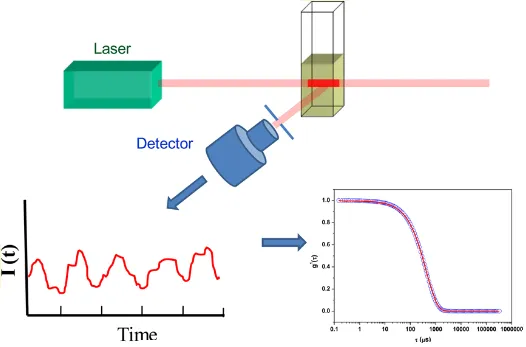Dynamic Light Scattering (DLS) Analysis Service | Drug Discovery
Dynamic Light Scattering (DLS) is a biophysical technique based on the principle of Brownian motion, used to measure the hydrodynamic diameter and size distribution of particles in solution. Through DLS, researchers can analyze key properties such as hydrodynamic size, size distribution, polydispersity index (PDI), aggregation state, and stability over time. These physical characteristics are critical in drug development, as they reflect the quality of candidate molecules and support formulation optimization, process scale-up, and CMC consistency evaluation.
Equipped with an advanced light scattering platform, MtoZ Biolabs provides high-quality Dynamic Light Scattering (DLS) Analysis Service tailored for drug discovery and biopharmaceutical development. Our service helps clients identify risks and optimize strategies in the early stages of development, accelerating candidate selection and evaluation.
Services at MtoZ Biolabs
DLS measures fluctuations in the intensity of scattered light caused by the Brownian motion of particles under laser illumination. These fluctuations are used to calculate the diffusion coefficient, which is then converted into hydrodynamic diameter using the Stokes-Einstein equation. This diameter reflects the particle's effective spherical size in solution, including its hydration shell. DLS is applicable to proteins, nanoparticles, liposomes, lipid nanoparticles (LNPs), and polymer-based drug delivery systems.

Hassan, PA. et al. Langmuir. 2015.
Figure 1. The Principle of Dynamic Light Scattering
MtoZ Biolabs’ Dynamic Light Scattering (DLS) Analysis Service includes, but is not limited to:
1. Measurement of hydrodynamic diameter (Z-Average)
2. Particle size distribution and PDI analysis
3. Initial assessment of aggregation state
4. Stability trend monitoring under accelerated or varied conditions
5. Comparative particle size analysis across formulations or batches
This service can be performed as a standalone offering or integrated into broader analytical workflows for biologics, nanomedicine, and protein therapeutics.
Analysis Workflow

Service Advantages
1. Advanced Platform
MtoZ Biolabs utilizes a high-sensitivity DLS platform capable of measuring particles from the nanometer to micrometer scale, suitable for proteins, peptides, liposomes, LNPs, and polymeric drugs. With temperature control and multi-angle detection, the platform supports reliable assessment of particle stability, aggregation, and size distribution across development stages.
2. Professional Team
Our team consists of scientists with backgrounds in biophysics, pharmaceutics, and analytical chemistry. They are well-versed in the applications and limitations of DLS in drug development. We provide tailored protocols, sample preparation guidance, and data interpretation to ensure results are scientifically relevant and actionable.
3. Transparent Pricing
We offer standardized and transparent pricing to help clients plan budgets effectively. Service components and fees are clearly defined, with no hidden charges. Flexible service packages are available depending on sample volume, analysis depth, and turnaround time, especially suitable for fast-paced R&D pipelines.
4. Multi-Technology Integration
MtoZ Biolabs supports the integration of DLS with complementary techniques such as SEC-MALS, Zeta Potential, and Transmission Electron Microscopy (TEM), enabling multi-dimensional analysis of complex systems. This integrative approach strengthens data reliability and provides structural insight for mechanism studies and regulatory submissions.
Applications
✔ Particle size assessment of liposomal and LNP-based delivery systems
✔ Aggregation monitoring in protein or antibody therapeutics
✔ Stability evaluation under storage or stress conditions
✔ Batch-to-batch consistency analysis during process development
✔ Screening of particulate consistency in vaccine formulations
✔ Comparative analysis of generic vs. reference product particle properties
FAQs
Q1: Can samples containing aggregates be analyzed?
A: DLS is sensitive to aggregation and can detect large particle presence. However, for highly polydisperse samples, we recommend complementary analysis via SEC or electron microscopy for better resolution. We offer both services.
Q2: Do samples require pretreatment?
A: For accurate measurements, samples should be free of bubbles and visible precipitates. For complex formulations, we suggest discussing pretreatment strategies with our technical staff in advance.
Q3: What is the turnaround time for Dynamic Light Scattering (DLS) Analysis Service?
A: For standard DLS analysis, results can typically be delivered within 3–5 business days, provided that the samples meet testing requirements. If the project involves multiple batches, time-course stability studies, or integration with other techniques (e.g., SEC-MALS, TEM), the timeline will be evaluated based on project complexity and clearly communicated with the client before order confirmation. Expedited services are available upon request and can be flexibly arranged based on actual needs.
Sample Submission Suggestions
| Sample Type | Recommended Volume | Notes |
|---|---|---|
| Protein Solutions | ≥100 µL, ≥0.5 mg/mL | No preservatives or viscous agents |
| Liposomes / LNPs | ≥200 µL | Store and ship cold, protected from light |
| Polymer Solutions | ≥100 µL | Include solvent details |
| Other Samples | Contact our team | Customized based on system properties |
Deliverables
1. Particle size distribution curves (Intensity / Volume / Number-based)
2. Hydrodynamic diameter (Z-Average) and PDI values
3. Summary of analytical parameters and conditions
4. Preliminary technical comments or comparative interpretation (if applicable)
5. Optional raw data tables (upon request)
In modern drug development, particle size and its distribution are essential parameters influencing the performance and safety of candidate drugs. MtoZ Biolabs offers reliable, efficient, and high-quality Dynamic Light Scattering (DLS) Analysis Service supported by a dedicated platform and a team of experienced scientists.
Contact us and explore how our service can support your project.
Related Services
How to order?







